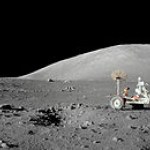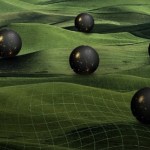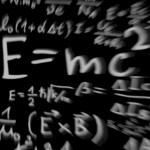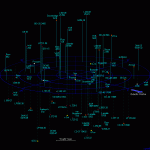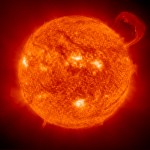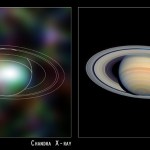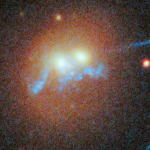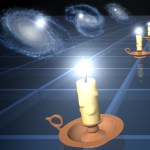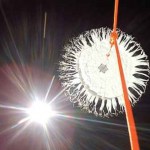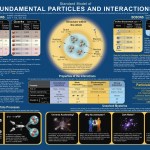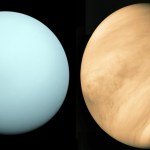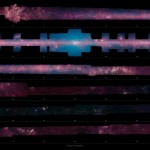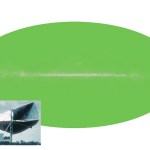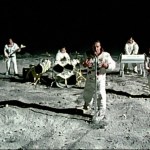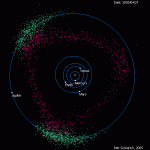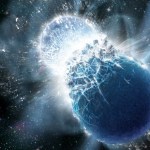
“Curiosity is the essence of human existence. ‘Who are we? Where are we? Where do we come from? Where are we going?’… I don’t know. I don’t have any answers to those questions. I don’t know what’s over there around the corner. But I want to find out.” -Eugene Cernan, last human on the Moon
It's been nearly 43 years since humans have set foot on the Moon, and yet we've never forgotten what it looks like.
Image credit: NASA / Apollo 17 / East view of station 1, via http://www.lpi.usra.edu/resources/apollopanoramas/.
Yet nothing that anyone can describe -- either about what it was like or…
“The saddest aspect of life right now is that science gathers knowledge faster than society gathers wisdom.” -Isaac Asimov
Yet it's that intersection -- of science with our day-to-day lives, our imaginations, our hopes, fears and dreams -- that's going to be the thing that drives us towards a scientifically literate future. Have a listen to Leonard Cohen’s dark, apocalyptic vision of it,
The Future.
But when I think of the future -- when I think of it optimistically -- I think of one where we trust what science tells us to the best of our confidence, and use technology,…
“That there were other worlds, invisible, unknown, beyond imagination even, was a revelation to him.” -Kim Edwards
And every time two particles interact with one another, the Universe is forever different from how it was a moment before. Here at Starts With A Bang, this past week saw us explore a number of aspects of our ever-changing reality, including:
Why does E=mc^2? (for Ask Ethan),
The astronomer who brought us the Universe (for our Weekend Diversion),
A beautiful bridge between a lovely lens (for Mostly Mute Monday),
Photonic Booms (a fantastic…
“Try to imagine what it will be like to go to sleep and never wake up… now try to imagine what it was like to wake up having never gone to sleep.” -Alan Watts
Neutron star matter is the stuff of legends: it's the densest three-dimensional material to exist in our Universe. With a density some 10^22 times that of water, you might think that a tiny chunk of it would be incredible to possess.
Image credit: The Mighty Thor / Marvel Comics.
But would such a chunk be stable, or would something catastrophic happen if you took a dense group of neutrons out of a neutron star? And if a small amount…
“As a boy I believed I could make myself invisible. I’m not sure that I ever could, but I certainly had the ability to pass unnoticed.” -Terence Stamp
When you take a look at the stars visible in the night sky, you're only seeing a tiny fraction of what's actually present in our galaxy. Your intuition would tell you that you're probably seeing the closest stars to Earth, but that's only partially right.
Image credit: Richard Powell of http://www.atlasoftheuniverse.com/.
Of the ten closest star systems in the night sky, only two of them are visible to the naked eye, and if we start to…
“Every time we get slapped down, we can say, ‘Thank you, Mother Nature,’ because it means we’re about to learn something important.” -John Bahcall
And what's possibly more important than learning how the Sun works? For nearly all of human history -- well into the 20th century -- we really didn't know.
Image credit: NASA, ESA, and G. Bacon (STScI).
Could it have been combustion, like we see on Earth? Or perhaps gravitational contraction, like that which powers white dwarf stars?
No, it turned out to be nuclear fusion. Yet when we built our best models and went to test what we expected to…
Imagine the surface of the Moon, so distant, and an infinitely precise and powerful laser pointer. With a flick of your wrist, you can send the dot that you see flying across the Moon's surface as quickly as you can manage.
Image credit: Sabine Hossenfelder.
Without too much difficulty, in fact, you'll find yourself breaking the speed of light! Not in terms of violating special relativity or anything, but if you follow the motion of the dot, you'll not only find that it appears to move faster than the speed of light in a vacuum, c, but that its behavior is more interesting -- and more…
“Look and think before opening the shutter. The heart and mind are the true lens of the camera.” -Yousuf Karsh
When you find an incredibly huge, dense collection of mass, all together in one place, it generally indicates a galaxy cluster of tremendous size.
Image credit: NASA, ESA, G. Tremblay (ESO), M. Gladders and M. Florian (University of Chicago), S. Baum, C. O’Dea, K. Cooke (RIT), M. Bayliss (Harvard-Smithsonian Center for Astrophysics), H. Dahle (University of Oslo), T. Davis (ESO), J. Rigby (NASA/GSFC), K. Sharon (University of Michigan), E. Soto (Catholic University of America), and…
“Her will tells nearly all. She left an estate worth $314.91, mostly in Liberty Bonds, with a few items such as a desk valued at $5. She never married and had few living relatives. She also left behind a legacy of a great astronomical discovery.” -Jeremy Bernstein, on Henrietta Leavitt
Today is International Women's Day, and to celebrate, I not only have a killer cover by Cat Power that gives an amazing amount of actual emotion to Oasis' bland-pop hit from the 1990s,
Wonderwall,
but a story that left perhaps the greatest legacy in all of astronomy. I can think of no better way to celebrate…
“Many have argued that a vacuum does not exist, others claim it exists only with difficulty in spite of the repugnance of nature; I know of no one who claims it easily exists without any resistance from nature." -Evangelista Torricelli
The Universe is here, within us, out there in the great abyss beyond, and in our abstract imaginings, as the theoretical, observational and experimental all get their moments to shine here at Starts With A Bang. This week saw the dawn of a new month and articles across a wide variety of topics, including:
Humans in the vacuum of space (for Ask…
“It followed from the special theory of relativity that mass and energy are both but different manifestations of the same thing — a somewhat unfamiliar conception for the average mind.” -Albert Einstein
On the one hand, we have matter -- things with mass -- in the Universe, ranging all the way from planets, stars and galaxies on the largest scales to molecules, atoms and fundamental particles on the smallest.
Image credit: Jenny Mottar.
But then, on the other hand, there are particles without mass at all: photons, for example. They still carry energy and momentum, but of all the…
“Science enhances the moral value of life, because it furthers a love of truth and reverence — love of truth displaying itself in the constant endeavor to arrive at a more exact knowledge of the world of mind and matter around us, and reverence, because every advance in knowledge brings us face to face with the mystery of our own being.” -Max Planck
When it comes to our Universe, you might think we understand it pretty well. We have a full list of particles we know to exist, we understand the forces that describe their behavior, and we've been able to detect and measure each and every…
“Surprise is the greatest gift which life can grant us.” -Boris Pasternak
When it comes to theoretical physics, you might realize the entire point is to set up a framework to predict what phenomena are going to occur in the Universe. So if you rewind the clock back to very early times, set up the initial conditions and apply those laws, you would expect to get our Universe out, if we've gotten things correct.
Image credit: Wikimedia Commons user Unmismoobjetivo; of a logarithmic view of the Universe as centered on the Earth.
And if we don't have things figured out properly? We'll…
“Since you cannot do good to all, you are to pay special attention to those who, by the accidents of time, or place, or circumstances, are brought into closer connection with you.” -St. Augustine
When you look up at the sky, all the twinkling lights -- the stars -- appear to be fixed.
Image credit: The Curious Skywatcher, via http://curiousskywatcher.blogspot.com/2012/04/zodiacal-light-your-best-….
But littered among them are the non-twinkling wanderers: the planets. Just 11 days ago, the Mars/Venus conjunction occurred, giving us a spectacular view of two naked-eye planets separated by a…
“Beauty is unbearable, drives us to despair, offering us for a minute the glimpse of an eternity that we should like to stretch out over the whole of time.” -Albert Camus
There's nothing quite like the plane of our Milky Way galaxy. Some 200-400 billion stars are located there, including our own Sun. From our vantage point within it, most of these are obscured by the dust lanes present within.
Image credit: NASA/JPL-Caltech/the GLIMPSE team.
But thanks to its views in infrared light, the Spitzer Space Telescope can glimpse not only all of the stars and the dust simultaneously, it can do it…
“An ancestor of mine maintained that when you eliminate the impossible, whatever remains, however improbable, must be the truth.” -Mr. Spock, Star Trek
Sometimes the truth is hard to handle on its own, so we resort to fiction to make it a little easier to swallow. Have a listen to Summer Fiction’s song,
By The Sea,
while you consider one of the greatest "fictions" we've ever told ourselves to do exactly that: Star Trek.
Image credit: Star Trek fan art, via https://nasimali.wordpress.com/2014/12/17/film-star-trek-should-not-fol….
In many important ways, Star Trek was unlike any of the…
"True happiness comes from the joy of deeds well done, the zest of creating things new." -Antoine de Saint-Exupery
Every week holds an amazing look at the Universe in a unique way here at Starts With A Bang, and this week saw not only a series of new posts from me, but two contributed ones, including the debut of the fabulous Jillian Scudder of Astroquizzical. If you missed anything, here's a look back at what we've covered:
The very early Universe (for Ask Ethan),
Bubbles on ice (for our Weekend Diversion),
Crater chains of the Moon (for Mostly Mute Monday),
What…
“A vacuum is a hell of a lot better than some of the stuff that nature replaces it with.” -Tennessee Williams
The depiction of dying in space -- by exposure to its terrifying vacuum -- is incredibly varied, from freezing to swelling and bulging to simply exploding.
Image credit: Mike Tyson Mysteries / Adult Swim. Uh oh, looks like I killed another astronaut!
For this week's Ask Ethan, we take on the question of Kerrie Pinkney, who wants to know:
[W]ill you explode if exposed to the vacuum of space? I’ve gone down the “water boils in a vacuum then freezes” road, others have gone down the “…
“The moon was like this awesome, romantic, mysterious thing, hanging up there in the sky where you could never reach it, no matter how much you wanted to. But you’re right. Once you’re actually here, it’s just a big, dull rock.” -Futurama
Oh, but the big dull rocks are fascinating in their own right. Especially, mind you, when there are more of them than we ever expected. Jupiter, for example, has not only all the moons that orbit around it, but a whole slew of gravitationally captured objects -- the Trojans (and Greeks) -- that orbit in front and behind it.
Image credit: Petr…
“End? No, the journey doesn’t end here. Death is just another path, one that we all must take. The grey rain-curtain of this world rolls back, and all turns to silver glass, and then you see it.” -J.R.R. Tolkien
No matter how well we care for our bodies, they eventually wear down, give out, and we all will someday face death. Yet if there's anything to be learned from looking at the physical Universe, there's no reason to expect that death is truly the end.
Image credit: NASA/ISS Expedition 28.
Every time a star runs out of fuel and dies, no matter what type of star it is or what fate…
